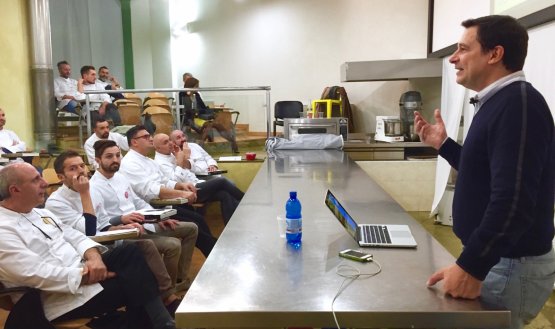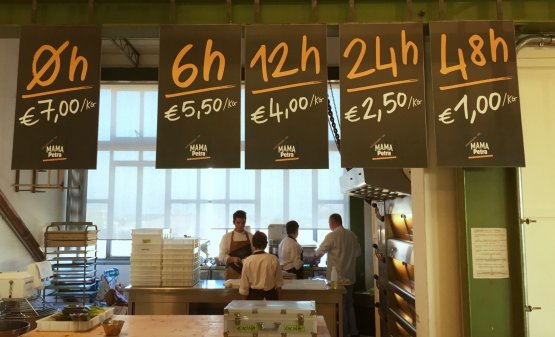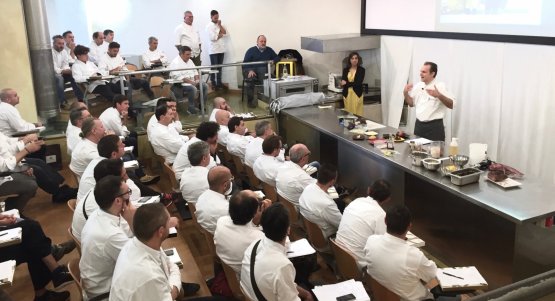Contemporary men are what they do not eat. The second day at PizzaUp, in Vighizzolo d’Este, was mostly founded on the overturning of Feuerbach's classic paradigm. Contemporaneity, in other words, is also based on food taboos which in most cases are not indicated by canonical religions but by other dogmas: the dietician dogma (it is not by chance that anthropologist Marino Niola speaks about this as if it were a new lay religion in Homo dieteticus), the healthy, the social (which would force us to “eat elegant food”, whatever this may mean), the anti-gm-food and so on.
«Men are what they do not eat», this was proclaimed in black and white by Dario Bressanini in his explanatory lesson covering fake myths in food. «There's too much psychological terrorism going on. An obsession for a particular food or ingredient is being nourished – one can say. One day “00” flour causes cancer, and it's not true at all; the next it's red and cured meat, which is only partly true, it depends on the quantities. Monodiglycerides and glutamate have a terrible reputation, unjustly so, when the problem is, if any, that they are used to “cover” food that is awful by itself, badly prepared. And then it turns out that green tea, chia seeds or goji berries are a panacea».

Dario Bressanini's lesson
This is all rubbish, taken as a single choice, what counts is the basic behaviour, «you need a balanced diet. Of course it is excellent to eat every day around 30 grams of fibres, which have a protective function: hence whole-cereals, fruit, legumes, vegetables…».
Culturally speaking, «one needs to eliminate the neo-pagan idea that what derives from man is harmful while what comes from nature is healthy». Hemlock is poisonous, gm food is not: «All we eat is genetically modified. There's no such thing as tender wheat in nature, it is a genetic modification that happened spontaneously, it was not induced. Without these processes, carrots would still be purple and tomatoes yellow». The only difference is that these modifications were casual events while today scientists are inducing them. This is what scares us, in most cases without any reason.
Man is what he (no longer) eats, points out Lisa Casali, in her duet with Bressanini. «I analysed the quantity of left overs in our kitchen, in terms of vegetables: they reach 50% on average, from 10% in potatoes to 80% in artichokes, with seasonal differences (during colder months vegetables protect themselves more)». Potential food is discarded because of induced habits. Or as a reaction, in order to exorcise the ghost of a defeated poverty, of which there's still a generational memory.

Bread prices at Mamapetra
, then says
Paolo Marchi, to whom the counter-melody was assigned: «Today we discuss at length about cooking made with leftovers, but this is a concept that still only reaches a limited part of the population, because we've fought hunger for centuries and dreamt of abundance, which is in fact waste. Until recently – and this still happens, especially far from larger cities – you'd go to the restaurant to eat lots of food and refined ingredients, lobster and caviar. Presenting turnip peels in a fine dining restaurant today is a remarkable cultural leap, perhaps in Italy this has only been taking place for a few years now, and only in dynamic places, such as Milan».
And perhaps not even there, says Piero Gabrieli: «We opened a temporary shop, bakery Mamapetra, inside Mercato Metropolitano in Milan. We offer high quality loaves, the kind that keep for more days without any problem; in fact we explain they are best from the following day, because they loose part of the initial humidity. We sell them at 7 euros per kilo when out of the oven, when we suggest not to buy them, and at 2.5 euros after 24 hours and at 1 euro after two days, when they're still perfect». The average sales, however, is over 6.80 euros, that is to say that people choose the worst quality-price ratio. It's absurd, «people are ashamed to buy cheaper bread, it's a matter of social image», comments Marchi. Or perhaps we're even too used to terrible bread, which cannot be eaten after a few hours?

Nicola Portinari on the stage; Lisa Casali is next to him, Paolo Marchi observes with attention
However, re-using leftovers is now accepted even in fine dining. This is demonstrated by
Nicola Portinari, of
La Peca in Lonigo, not too far away, who advises the pizza chefs participating in the symposium to use techniques such as vacuum and low temperature cooking that are not new though new technologies present them with clear advantages: they prolong food life (he explains: meat vacuum cooked between 58 and 65°C for two hours can be preserved for over 40 days) and make it possible to use parts that were traditionally considered too hard, leathery or stodgy for their consumption to be pleasant: «It's like blenders with woody vegetables or fruit that is over-ripe but not rotten; and low temperature cooking in roner ovens can be used for less precious cuts of meat».
Of course, you also need culture to discuss these themes. «There was this guy just out of catering school working with me – the chef says – I told him: clean the courgettes. He started peeling them». In this case, it is a waste of intelligence, that's it. Best not re-use it.